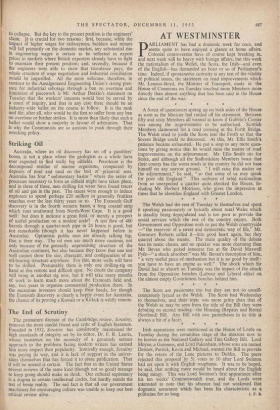AT WESTMINSTER
pARLIAMENT has had a domestic week for once, and seems quite to have enjoyed a glance at home affairs. Colonial controversies have of course kept breaking in, and next week will be heavy with foreign affairs, but this week the nationalism of the Welsh, the Scots, the Irish—and even of the English—has demanded an hour or so of Parliament's time. Indeed, if spontaneous curiosity is any test of the.vitality of political issues, the statement on road improvements which Mr. Lennox-Boyd, the Minister of Transport, made in the House of Commons on Tuesday touched more Members more directly than almost anything that has been said in the House since the end of the war.
* * * * A forest of questioners sprang up on both sides of the House as soon as the Minister had rattled off his statement. Between fifty and sixty Members all wanted to know if Gubbin's Corner was among the improvements to be authorised, Scottish Members clamoured for a road crossing at the Forth Bridge. The Welsh tried to jostle the Scots into the Forth so that the Severn Bridge could be discussed. At this, Mr. Ellis Smith's patience became exhausted. He put a stop to any more ques- tions by giving notice that he would raise the matter of road improvements on the adjournment. Mr. Ellis Smith sits for Stoke, and although all the Staffordshire Members boast that their county has the worst roads in the country he did not base himself on any narrow ground. " I will raise this matter on the adjournment," he said, " so that some of us may speak for poor old England." This outburst of rabid nationalism from so unexpected a quarter quite shocked the House, in- cluding Mr. Herbert Morrison, who gives the impression at times that he identifies England with Greater London.
* * * * The Welsh had the rest of Tuesday to themselves and spent it speaking passionately or lyrically about rural Wales which is steadily being depopulated and is too poor to provide the social services which the rest of the country enjoys. Both Government and Opposition wish to put the Welsh countryside —" the reservoir of a sweet and democratic way of life," Mr. Goronwy Roberts called it—into good heart again, but they quarrel about the means. The main quality of the debate was its rustic charm, and no speaker was more charming than Mr. Bevan who poked innocent fun at Sir David Maxwell Fyfe—" a shock absorber," was Mr. Bevan's description of him, " a very useful piece of mechanism but it is no good by itself : you have to have an engine as well." The shock which Sir David had to absorb on Tuesday was the impact of the attack from the Opposition benches (Labour and Liberal alike) on the almost empty Government benches behind him. * * * * The Scots are passionate too but they are not so unself- consciously lyrical as the Welsh, The Scots had Wednesday to themselves, and their topic was more gritty than that of the Welsh as may be seen from the title of the Bill they were debating on second reading—the Housing (Repairs and Rents) (Scotland) Bill. Any Bill with two parentheses in its title is always a bit of a facer. * * * * Irish aspirations were mentioned in the -House of Lords on Tuesday during the committee stage of the measure now to be known as the National Gallery and Tate Gallery Bill. Lord Moyne, a Guinness, and Lord Pakenham, whose sons are named Dermot, Patrick, Kevin and Michael, wanted the Bill to provide for the return of the Lane pictures to Dublin. The peers rejected this proposal by 51 votes to 10 after Lord Swinton had sat upon it with English roughness. It was to be hoped, he said, that nothing more would be heard about the English being mingy. This was Lord Swinton's first appearance after his ten weeks' Commonwealth tour, and the Lords were interested to note that his absence had not weakened that dogmatic assurance which has been his characteristic as a


































 Previous page
Previous page